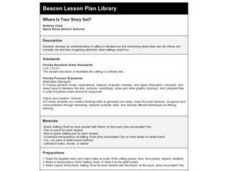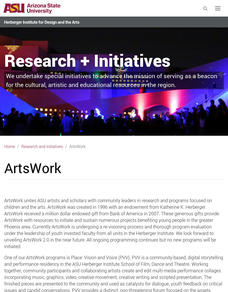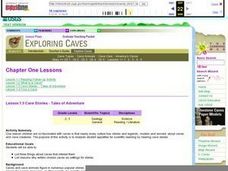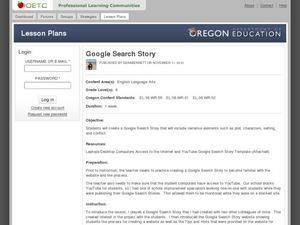Curated OER
Character and Plot Development Through Comics
Third graders are introduced to character, plot development, point of view, and tone through the use of comic strips. They, in pairs, identify these four attributes in the comic strip and present their findings to the class.
Curated OER
Where Is Your Story Set?
Students explore the concept of setting in literature by identifying their own current setting, and imagining what their ideal setting would be. They read a piece of literature, identify the setting and record the information on a chart.
Curated OER
Story Elements/ Setting
Students practice the story element of setting. In this setting lesson plan, students listen to the story Tulip Sees America by Cynthia Rylant. They discuss and describe the places that Tulip saw in the story.
Curated OER
Create - A - Story
Apply the elements of a story to create an original story. They select a character, setting, and plot out of a bag, and write an original story tying the three story elements together.
Curated OER
Lesson Plan 7: The Elements of Story
Budding novelists work on character development by relating to the characters in their stories. They imagine their own hopes and dreams and recall those of characters from books they've read. Learners also consider struggles the...
Curated OER
Narrative Nuts and Bolts
After viewing slides and reading about child labor, young authors compose an original narrative story. They practice note-taking skills and work to effectively engage a reader by incorporating plot, logical order, complex characters,...
Curated OER
Creating Plays from Children's Stories
Students explain how individual elements (e.g., plot, theme, character, conflict, etc.) comprise the structure of a play. They write an original one-act play with developed characters, specific setting, conflict, and resolution.
Curated OER
Puss in Boots/Jamil and the Clever Cat
Second graders read the story PUSS IN BOOTS identifying main characters, setting, and significant events. They then read the story JAMIL AND THE CLEVER CAT and compare it with the story PUSS IN BOOTS compiling a list of characters,...
Curated OER
Descriptive Writing-The Hobbit
Young readers write a descriptive paper on the fantasy characters in The Hobbit. They take notes as they read the novel in order to provide descriptions of the character traits of hobbits, dwarfs, trolls, wizards, and goblins. They pay...
Curated OER
Shakespeare 2000
Comparing the more modern film Ten Things I Hate About You to The Taming of the Shrew leads to an understanding of how Shakespearean plots can be applied to modern-day situations and characters. As a culminating activity, groups select a...
Curated OER
Understanding a Narrative: The True Story of Balto
Strong comprehension questions and a list of initiating events that drive the plot make this resource worth a try in your classroom. Intended for use with tools specific to the mindwing concepts reading strategy system, the outline...
Curated OER
Chain Together A Book Report
Individuals examine a book's components, including key events, characters, and vocabulary and develop "chain book reports" with their peers. Strips of paper containing the book's important events are staples together and hung.
Curated OER
Cops and Robbers
Second graders observe the teacher model writing a letter to the author of the book, COPS AND ROBBERS. They then compare the story structure of the book to those of FUNNYBONES and identify the setting, characters and theme.
Curated OER
Writing Scripts
Create a classroom full of writers using this innovative technique. The presentation walks learners through the process of writing a script, including identifying the setting, characters, and major events in the story. After reviewing...
Curated OER
Introduction To Literary Analysis
Explore the fascinating ways in which authors use specific literary devices to create interesting and realistic texts. Using non-fiction articles with the subject of rogue waves, an excerpt from The Perfect Storm, by Sebastian Junger,...
Curated OER
Pick A Short Story
Students select a short story and apply various literary elements they have used throughout the year. They deconstruct a short story according to plot, setting, characterization, and theme. Students create a PowerPoint.
Curated OER
Cave Stories - Tales of Adventure
Students list three things about caves that interest them and list reasons why writers choose caves as settings for stories.
IPDAE
Themes in Short Stories
"What is the theme of this story?" The very question can spark fear in the minds of readers and incinerate confidence. Here you will discover an exercise that shows how writers use the tools of setting, plot, conflict, and...
Hawaiʻi State Department of Education
Story Design
Stories contain very specific elements; plot, characters, and key events. Learners use pantomime to retell a key event from the beginning, middle, and end of a story. They discuss setting and character as each group discusses and then...
EngageNY
Launching Lyddie
Pupils engage in a close reading of chapter one of Katherine Paterson's novel, Lyddie. After answering text-dependent questions based on their reading, they complete reader's notes about how the setting, characters, and plot interact.
Curated OER
Google Search Story
After searching Google for YouTube videos, pupils will create a Google Search Story. The process of creating these stories will provide practice using narrative elements such as, plot, characters, setting, and conflict. Note: Resource...
EngageNY
Close Reading to Learn about Lyddie’s Character
Scholars work in pairs to analyze the characters, plot, and setting of Katherine Paterson's novel, Lyddie. Next, they apply what they learned about the characters' feelings and motivation to perform a mini reader's theater.
Virtual Vine
Cat In the Hat Story Elements
Engage your pupils in a plot activity based on the favorite Dr. Seuss book, The Cat in the Hat. There are two pages included here. The first is a list of plot elements and the second is a grid of plot points and other information. Class...
Pinecrest Preparatory Middle and High School
Short Story Planning Guide
A short story is only as strong as its characters, development, and conflicts. Encourage the young authors in your class to plan their stories based on the elements of narrative writing, all provided in brainstorming graphic organizers.

























